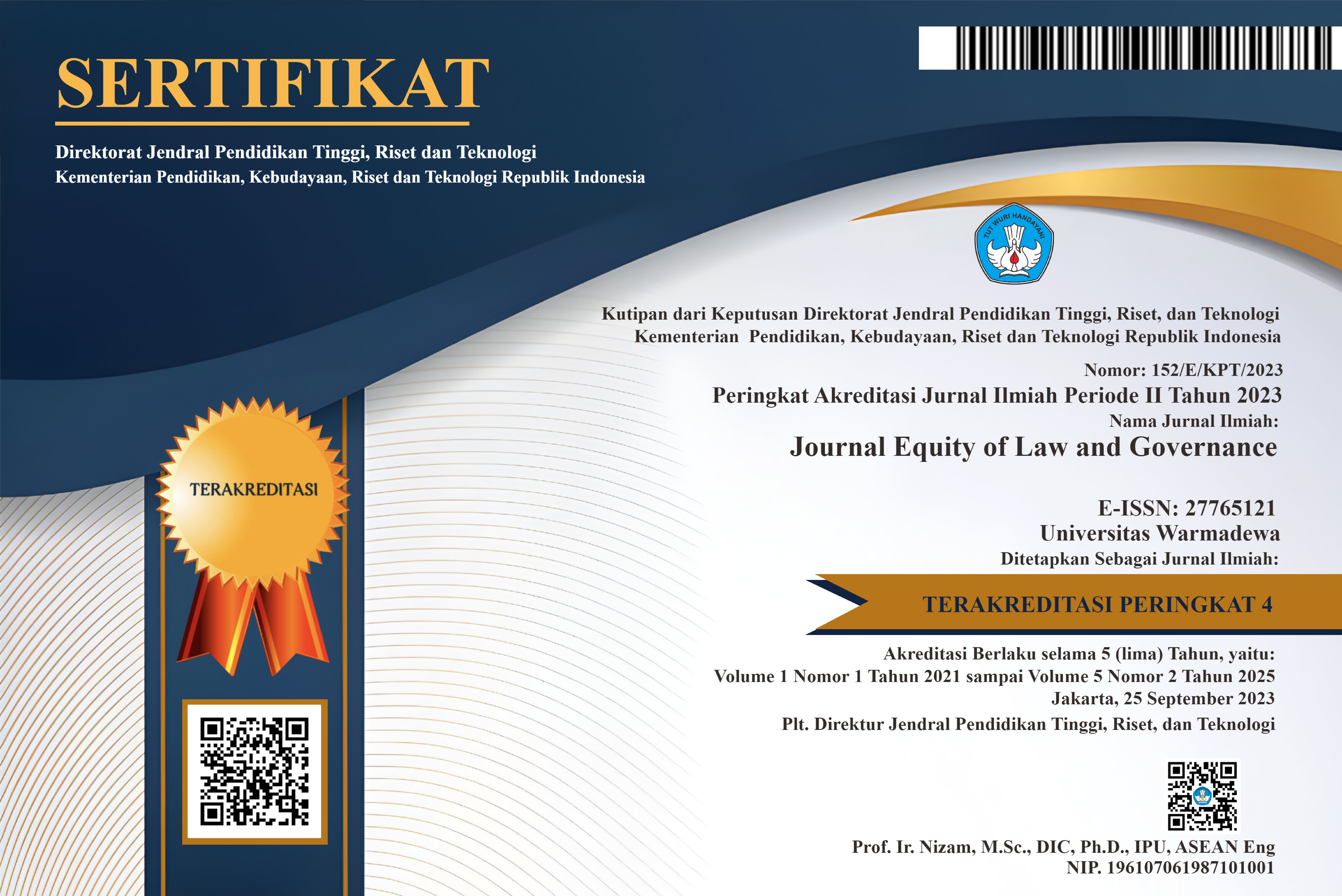STRENGTHENING BALI TRADITIONAL LAW THROUGH WRITTING CUSTOMARY LAW OF TRADITIONAL VILLAGE
Abstract
The formulation of customary law norms for marriage and inheritance needs to be constructed through Awig-Awig (customary law) formulation to ensure legal certainty in strengthening Balinese customary law. The Awig-Awig formulation is a form of codification of Balinese customary law, which regulates traditional village members and their various activities, Parhyangan (temple) as a forum for village members to connect with Ida Sang Hyang Widi Wasa (God Almighty) and at the same time as a means of preserving Balinese culture, Palemahan (land) as a manifestation of the territory and at the same time as an area that becomes the foundation of the source of life and a foothold in living life until death in a harmonious relationship. In the development of the life of village members, which are always in process, it is necessary to confirm the arrangement through Awig-Awig formulation, such as in the field of membership of village members with their rights and obligations, marriage, inheritance with the intention of being enforced consistently and dynamically according to appropriate values ​​in a society that is always developing.
References
Bali Express.Com, 2019, “Canggu Residents Reject Execution of Pura Hyang Ibu Pasek Gaduhâ€, Ed. Nyoman Suarna, October 29th 2019, accessed November 1st 2019.
Darji Darmodiharjo dan Shidarta. 1996. Principles of Legal Philosophy, What and How Indonesian Legal Philosophy, Revised Edition, Second Printing, PT. Gramedia Pustaka Utama, Jakarta.
Derana, Tjokorda Raka. 1983/1984, “Outline of Guidelines for Writing Awig-Awig Traditional Villageâ€, Project for Strengthening Customary Institutions and Development of the Subak Museum.
Koesnoe, Moh. 1979, Present Notes Against Customary Law, Print I, Airlangga University Press, Surabaya.
Lili Rasjidi. H., dan Ira Rasjidi, Fundamentals of Philosophy and Legal Theory, Eighth Printing, Citra Aditya, Bakti Bandung.
Regional Traditional Institutions Development Council of Bali Level I Area. 1989/1990, “Introducing and fostering traditional villages in Bali.†The Customary Institution Stabilization Project is spread across eight districts of Level II Area.
Traditional Institutions Development Council Bali Level I Area. 1990/1991. “The traditional village as the center of Balinese culture development.†The Customary Institution Stabilization Project is spread across eight districts of Level II. Area.
Ngurah Gde Agung. Anak Agung, 1986 “ Guideline s of Awig-Awig Writingâ€. Traditional Institutions Development Council Bali Level I Area.
Soekanto, 1973, Introduction to Legal Sociology, Bhatara, Jakarta.
Satjipto Rahardjo, 1986, Law and Society, Angkasa, Bandung.
Soleman Biasane Taneko, 1981, Fundamentals of Customary Law & The Science of Customary Law, Alumni. Bandung.
Suwitra. I Made, 2009, “The Existence of Tenure and Ownership of Customary Land in Bali in the Perspective of National Agrarian Lawâ€, Doctoral dissertation, Universitas Brawijaya, Malang, repository.warmadewa.ac.id. Bali Provincial Regulation Number 4 of 2019 concerning Traditional Villages in Bali, Regional Gazette of 2019 Number 4. Awig-Awig (customary law) of Gelgel Traditional Village Klungkung Subdistrict and Regency, 1980.
Awig-Awig (customary law) of Pekutatan Traditional Village Pekutatan Sub-District Jembrana Regency. 1985.
Awig-Awig (customary law) of Traditional Village Pekutatan Sub-District Jembrana Regency, 1987.
 Abstract viewed = 136 times
Abstract viewed = 136 times
 PDF downloaded = 143 times
PDF downloaded = 143 times













